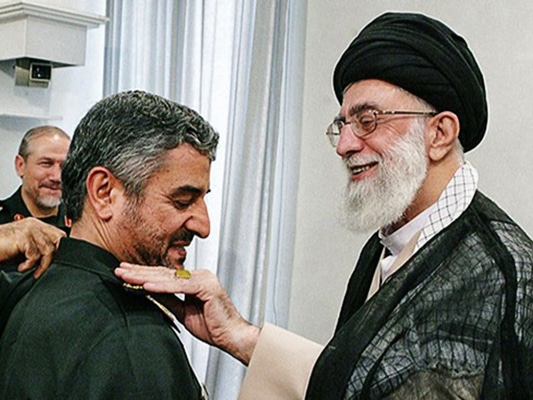Guards officer denies involvement in Iran’s economic activities
LATEST
An Islamic Revolutionary Guards Corps official says he is unaware of the Supreme Leader’s order for the organization to cut back its economic holdings.
After protests against Iran over political and economic issues earlier this month, the Supreme Leader’s office reported issued the command for the Guards to restrict their extensive stake in many of Iran’s businesses and industries. The Rouhani Government has been seeking the containment of the Guards’ holdings, arguing that they have distorted Iran’s economy and hindered recovery.
But Mohammad Saleh Jokar, the Guards’ Deputy for Parliamentary Affairs, said on Thursday, “I have not seen any such order from the Supreme Leader….Allegations that the IRGC and Artesh [Iran’s regular army] are involved in economic activities is questionable.”
Iran’s Defense Minister, Gen. Amir Hatami, confirmed the order on January 20: “Based on Ayatollah Khamenei’s edict, the general staff of the armed forces of the Islamic Republic have been told to begin the process of giving up those business interests not related to their mission.”
Hatami said that some Guards’ outlets, including its Khatam ol-Anbia industrial conglomerate, will continue their activities in the construction sector according to the needs of the Government.
Neither the Guards nor the Supreme Leader’s office has officially reacted to Hatami’s statement.
The Guards reaped a windfall from the “privatization” initiative of the Ahmadinejad Government between 2005 and 2013, buying up large shares in many of the State concerns.
However, Jokar insisted that the Guards’ activities are “non-profitable” and limited to the development of the country’s infrastructure.
“Khatam ol-Anbia industrial conglomerate participates in governmental bids, but never receives any profit for it,” Jokar said. “The IRGC has still 300 trillion rials (about $6.6 billion) in unpaid fees for governmental projects. Nevertheless, the IRGC still plans to complete these projects.”
Report: Female Political Prisoners Beaten
Political prisoners Atena Daemi and Golrokh Ebrahimi Iraee have been beaten in Tehran’s Evin Prison, according to their families.
Daemi’s mother Masoumeh Nemati said, after a phone call with her daughter, that the two women were assaulted on Wednesday night. THey were then transferred to a prison in Varamin, 37 miles south of Tehran.
According to Nemati, Daemi and Iraee were ordered to appear at a Revolutionary Court in early January 2018 for allegedly insulting the Supreme Leader Ali and reciting a political poem; however, the two refused, saying they had not been summoned in writing.
Daemi was given a seven-year sentence in November 2016 on charges that she met the families of political prisoners, criticized the Islamic Republic on Facebook, and condemned the 1988 mass executions.
Iraee, an accountant, was handed a six-year sentence in October 2016 for “insulting the sacred” and “propaganda against the State”, specifically for writing an unpublished story about stoning that was confiscated during a raid of her home by the Revolutionary Guards.
Iraee’s husband, civil rights activist Arash Sadeghi, is serving a 19-year sentence.
On July 8, 2017, Daemi and Iraee wrote a joint letter describing conditions in Evin Prison after foreign ambassadors were given a staged tour of certain sections without visiting any political prisoners:
Did they tell you about unsanitary conditions and women’s health? Or about the conditions inside the clinic where they prescribe wrong medications? Or about using sanctions and budget cuts as an excuse for the lack of disinfectants and cleaning material?
Supreme Leader Allocates $4 Billion from State Fund, Most for Armed Forces
The Supreme Leader has authorized the transfer of $4 billion from the National Development Fund of Iran, most of it for the armed forces.
The Fund was established in 2011 and receives 36% of Iran’s oil and gas revenue.
Ayatollah Khamenei authorized allocation of $2.5 billion for defense; $150 million for State broadcaster IRIB; $100 million for the reconstruction of areas hit by earthquakes and floods; $100 million for two nationwide vaccination projects; $350 million for water projects in the drought-stricken Sistan and Baluchistan Province in southeast Iran; and $150 million for recovery after duststorms.
A proposed allocation of $1 billion to settle accounts with retired teachers was reportedly removed, were funds for public transportation, railways, and development of neglected coastal regions in southeastern Iran.

